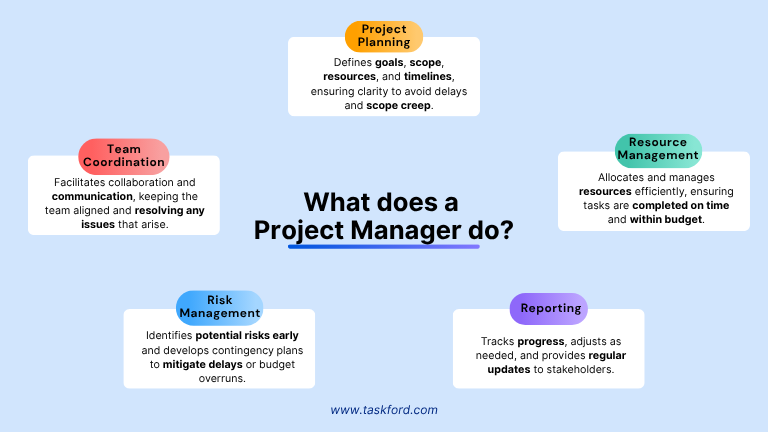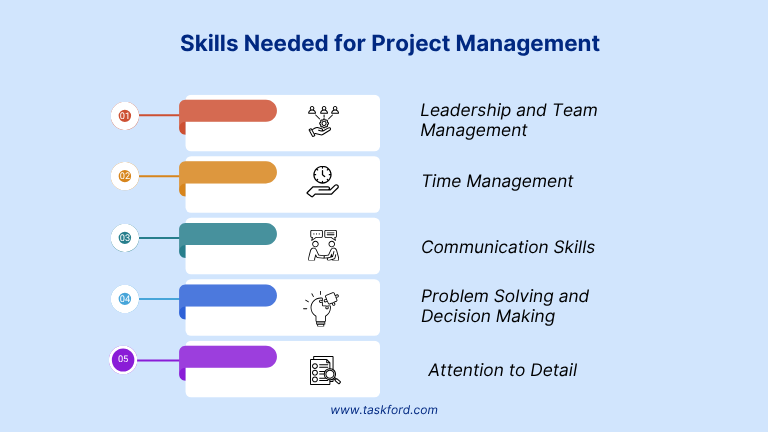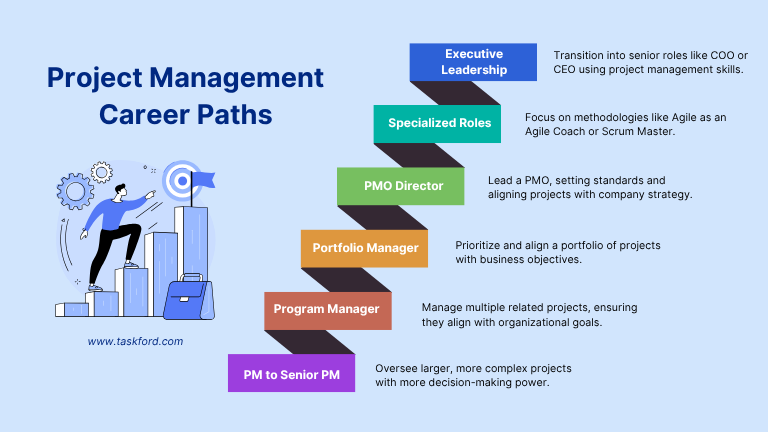What Does a Project Manager Do? A Guide to Advancing Your Career
Discover what a project manager does and explore the essential skills, responsibilities, and career paths in project management. Learn how to advance your career and thrive in this dynamic field.
Project management is more than just a job; it’s a dynamic and rewarding career that blends strategic thinking, leadership, and problem-solving. But what does a project manager do? If you’re curious about this fast-paced, challenging role or are aspiring to step into it, you’re in the right place.
Whether you’re in the early stages of considering this career path or you’re already managing projects but looking to take it to the next level, understanding the full scope of a project manager’s responsibilities and the key skills required is crucial. In this guide, we’ll dive deep into the daily life of a project manager, how to thrive in this role, and how you can elevate your career.
Ready to unlock the secrets of effective project management and take your career to new heights? Let’s dive in.
What Does a Project Manager Do?
A project manager (PM) is responsible for overseeing a project from its initiation to its completion. Their role involves a mix of leadership, strategic planning, communication, and problem-solving skills. A project manager ensures that everything aligns with the defined goals, timelines, and budgets, while also ensuring the project progresses smoothly, no matter the challenges faced along the way.
To answer the question, “What does a project manager do?” in detail, let’s break it down into core responsibilities:

1. Project Planning and Initiation
The first responsibility of a project manager is to plan the project. This involves defining the project’s objectives, deliverables, scope, and overall goals. During this phase, project managers also develop detailed schedules, allocate resources, create a project budget, and ensure that the scope is clear. A lack of clarity in this phase can lead to scope creep or project delays, so it is crucial for project managers to carefully outline all key aspects of the project before moving forward.
For example, in a website development project, the project manager would:
- Define the goals (e.g., develop a user-friendly, mobile-responsive site).
- Break down the development stages (e.g., planning, design, development, testing, deployment).
- Set deadlines for each stage.
- Determine which resources are necessary, such as developers, designers, and marketing personnel.
Good planning and proper documentation are essential to ensure everyone knows their roles, deadlines, and how they contribute to the project’s success.
2. Team Coordination and Communication
A project manager is responsible for ensuring that all team members are working collaboratively towards the project’s objectives. This involves constant communication, setting expectations, and ensuring that team members are working in sync with one another.
Effective communication is one of the most crucial aspects of the PM role. Without it, even the best plans can fail. A project manager must keep stakeholders informed, manage resources, and ensure that tasks are completed on time. Additionally, PMs must be adept at problem-solving when there is a miscommunication or roadblock, ensuring the team continues to move forward.
3. Risk Management
Every project comes with a certain level of risk, from potential budget overruns to unexpected delays. A project manager must identify these risks early on and develop strategies to mitigate them. A PM may anticipate risks in the project’s scope, resources, or timelines and put contingency plans in place.
For example, if a vendor fails to deliver a critical component, a project manager would need to have a backup vendor or solution in mind to prevent delays. Effective risk management is essential for keeping a project on track and preventing potential issues from derailing the project’s success.
4. Progress Monitoring and Reporting
Throughout the project, the project manager needs to track progress against timelines, budgets, and objectives. This involves regularly reviewing the status of the project, identifying any issues or delays, and making adjustments as necessary. Project managers use various tools like Gantt Charts, Kanban boards, or project management software (e.g., TaskFord) to monitor and report on the project’s performance.
In addition to internal monitoring, the project manager is also responsible for updating stakeholders on the project’s progress. These updates often come in the form of regular status meetings or reports, and a PM must be transparent about both successes and challenges.
5. Resource Management
A successful project manager ensures that resources are allocated appropriately and used efficiently. This includes managing the human resources required for the project (e.g., team members and contractors) as well as physical resources like equipment, technology, and materials.
For example, in a construction project, a project manager must ensure that workers, materials, and tools are available when needed, while avoiding delays or excess costs. Resource management also involves making sure the team is not overworked, that deadlines are realistic, and that every task is allocated to the most qualified individual.
Key Skills Every Project Manager Should Have
Project management requires a specific skill set that combines leadership, technical knowledge, and emotional intelligence. Here are the key skills necessary for every aspiring project manager:

1. Leadership and Team Management
A project manager is essentially the leader of the project team. They must be able to motivate, inspire, and guide their team members. Leadership in project management is not about micromanaging, but rather fostering an environment of collaboration, accountability, and mutual respect. A successful PM knows how to delegate tasks effectively, provide support when needed, and resolve conflicts if they arise.
2. Time Management
A large part of what a project manager does is ensuring that the project stays on track and is completed on time. Time management skills are critical, as project managers need to prioritize tasks, keep track of deadlines, and adjust the schedule as necessary. PMs use tools such as project management software (TaskFord, Asana, or Trello) to keep timelines and tasks organized and monitor the overall progress of the project.
3. Communication Skills
Since a project manager is the main point of contact between the team, stakeholders, and clients, strong communication skills are essential. A PM must be able to convey information clearly and concisely to different audiences, whether in meetings, through email updates, or via reports.
Effective communication also extends to active listening, which allows project managers to understand the concerns of team members and stakeholders and address them proactively.
4. Problem Solving and Decision Making
Challenges and obstacles are inevitable in any project. A skilled project manager must be able to think critically and come up with solutions to problems as they arise. Whether it’s a team member leaving the project unexpectedly or a key resource becoming unavailable, a project manager must be able to make quick decisions that keep the project moving forward.
5. Attention to Detail
While it’s important to see the big picture, a successful project manager also pays close attention to the smaller details. Overlooking even minor issues, such as a delayed approval or an overlooked task, can result in delays, cost overruns, and project failure.
Project Management Career Paths
As you grow in the project management field, you may wonder, “What’s next?” The good news is that project management offers several career paths, each with opportunities to specialize, take on more responsibility, or even move into leadership roles. Here are some potential career paths for experienced project managers:

1. Project Manager to Senior Project Manager
One of the most common career paths for a project manager is to progress to a senior project manager role. In this position, you’ll likely oversee larger, more complex projects or even multiple projects at once. Senior PMs often have more influence over high-level decisions, strategic planning, and resource allocation.
2. Program Manager
A program manager is responsible for overseeing multiple projects that are usually related to a broader organizational goal or initiative. While a project manager focuses on a single project, a program manager ensures that several projects are aligned and that they work together toward a common outcome.
Related: What is Program Management? How it goes beyond the project management
3. Portfolio Manager
Portfolio managers oversee an entire portfolio of projects and programs within an organization. The focus of a portfolio manager is on prioritizing and ensuring that the portfolio aligns with business objectives. This role requires a high level of strategic thinking and often involves making decisions about resource allocation across projects.
4. Project Management Office (PMO) Director
Many organizations have a Project Management Office (PMO), which oversees the standards and practices used in project management across the company. PMO directors are responsible for developing best practices, ensuring consistency across projects, and aligning projects with the company’s strategic objectives.
5. Specialized Roles (Agile Coach, Scrum Master, etc.)
For those interested in specific methodologies, such as Agile, there are roles like Scrum Master or Agile Coach. These positions require a deep understanding of Agile frameworks and help teams embrace Agile practices, improve workflow, and increase productivity.
6. Executive Leadership (COO, CEO, etc.)
As you gain extensive experience in managing projects and overseeing business outcomes, you may eventually move into senior executive roles like Chief Operating Officer (COO) or Chief Executive Officer (CEO). Many executives come from project management backgrounds because of their ability to manage resources, drive business goals, and lead large teams.
How to Advance Your Career as a Project Manager
If you’re looking to advance your career as a project manager, here are some essential steps you can take:
1. Obtain Certifications
Project management certifications are valuable assets for any PM looking to advance. The Project Management Professional (PMP) certification is one of the most widely recognized credentials in the industry. Other certifications like Certified ScrumMaster (CSM) or Agile Certified Practitioner (PMI-ACP) can also help you stand out in specialized fields.
2. Develop New Skills
As the field of project management evolves, so do the tools and techniques used to manage projects. Staying current with industry trends and learning new project management methodologies (like Agile or Lean) will keep you competitive. Investing in tools that streamline project planning, communication, and tracking can help you manage your projects more effectively.
3. Take on More Complex Projects
One way to demonstrate your abilities and gain experience is by taking on larger, more complex projects. These projects often involve more resources, multiple stakeholders, and higher levels of risk, providing a great opportunity to sharpen your skills.
4. Network and Seek Mentorship
Networking with other professionals in your industry can open doors to new opportunities and help you learn best practices from experienced PMs. Finding a mentor who has experience in project management can provide invaluable guidance and insight into how to navigate your career path.
Overcoming Challenges in Project Management
Even though the role of a project manager can be highly rewarding, it comes with its own set of challenges. Some common issues PMs face include:
1. Managing Stakeholder Expectations
One of the most common challenges is managing the expectations of various stakeholders. Clients or upper management may have different views on what the project should achieve or how it should be executed. A successful project manager must manage these expectations and keep all stakeholders aligned with the project goals.
2. Budget Overruns and Resource Constraints
Managing the project within budget and ensuring the efficient allocation of resources can be tricky. Unforeseen costs, delayed deliveries, or scope changes can quickly lead to budget overruns. A good PM must constantly monitor expenses and make adjustments to ensure the project remains financially viable.
3. Handling Tight Deadlines
Deadlines can be tight, and unexpected delays may occur, creating pressure to deliver the project on time. Project managers must be adept at managing time, adjusting schedules, and finding ways to meet deadlines without compromising on quality.
Conclusion
So, what does a project manager do? Simply put, a project manager is the orchestrator of a project. They plan, lead, manage resources, and ensure that the project is completed successfully, on time, and within budget. They play a critical role in driving business success by overseeing the execution of key initiatives and managing various moving parts.
For those looking to become or advance as a project manager, it’s essential to develop a robust skill set in leadership, communication, risk management, and resource allocation. Gaining relevant certifications and seeking out new learning opportunities will also set you apart in a competitive field.
By embracing these steps, you can position yourself for success and unlock a rewarding career as a project manager.
Useful Resources for Project Managers:
- What is project management? The Ultimate Guide for Beginners.
- Agile Project Management - Learn about its history, key values and frameworks.
- 80 Key Project Management Terms You Should Know
- What is Resource Planning? Definition, Examples, and How to do it right?
Subscribe for Expert Tips
Unlock expert insights and stay ahead with TaskFord. Sign up now to receive valuable tips, strategies, and updates directly in your inbox.